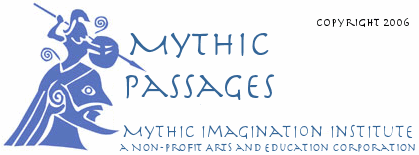|

More Midwinter Traditions
Excerpts from The Winter Solstice: The Sacred Tradtions of Christmas
By John Matthews with contributions by Caitlin Matthews
In this wonderful book, The Winter Solstice: The Sacred Traditions of Christmas,
the Matthews provide a beautifully illustrated, thorough and rich resource book for readers interested in Midwinter holidays
and traditions from many cultures around the world. We shared some of these in December, but the winter lasts longer so,
with the Matthews permission, we continue in this theme.
The Matthews, both presenters at Mythic Journeys 2004 and 2006, are the authors of more than 70 books primarily about
the Arthurian, Celtic, shamanic and spiritual traditions. John's best loved works include The Celtic Shaman, Healing the Wounded
King, and The Winter Solstice. Caitlin's books include Singing the Soul Back Home, Celtic Devotional, and
Sophia, Goddess of Wisdom. They are joint authors of The Western Way, The Encyclopedia of Western Wisdom,
and The Arthurian Tarot. The Matthews also teach worldwide.
John and Caitlin Matthews have given their written permission to quote from The Winter Solstice. This is copyrighted
material and may be reproduced only with written permission. For information on the U.S. edition of their books, contact
Quest Books, and for U. K. readers or for more information,
visit the Matthews' website.
Selections:
Honoring The Old One
In the Celtic world she is the Cailleach, the Old Woman who brings frost and snow and the bitter winds of Winter.
Among the Mandan Indians of North America she is "The Old Woman Who Never Dies," who offers bowls filled with earth and sky,
which are of great sacred significance to the tribe. Elsewhere she is the Mountain Mother, who carries great boulders in her apron,
occasionally letting them fall, and who is perhaps a creatrix from the beginning of time.
In each instance she personifies the cold dark days, and brings the snow, which is seen as feathers emptied from her pillow.
What follows is a modern invocation that expresses our own feelings at the arrival of the Cailleach.
Welcome to you, Old One
Welcome to the snow and ice,
The bitter cloud of your breath,
The pillow-feathered snow
Welcome you in, this Winter Day.
May your blessing hold us,
May your chills avoid us,
May the bright promise
Of each clear day
Remind us of your gifts.
Old one, cold one,
Though we fear your storms,
Yet we welcome you
Into our winter hearts,
With your cleansing breath,
To blow away the old year
And usher in the new.
—John Matthews: Invocation to the Old One
(from Chapter 1, p.46)
Listening To Your Needs
Make a list of the real wants and needs that you have within you. Consider the whole nature of gift giving and the
appropriateness of the things you yourself have given and received this year. Then, if you can, make a present to yourself of
one of the things you listed — give yourself more time, speak out about the desire for recognition of the person you really are.
And, next time you give a gift, whatever the occasion, put more of yourself into it, make something with your own hands if you can,
create your own wrapping paper and tie it up with wool instead of ribbon — make the gift a true giving of yourself.
And say, or inscribe, some special words to go with the present. Here is a suggested formulae, though you will certainly want
to find your own words as well:
Blessing On Giving A Gift
Take, and welcome joy within you:
Showers, flowers, powers,
Hatfulls, capfulls, lapfulls,
Treasures, measures, pleasures,
All be yours to enjoy!
—Caitlin Matthews:A Celtic Devotional
Giving the Gift
You shall receive whatever
gift you may name,
as far as wind dries,
rain wets, sun revolves;
as far as sea encircles
and earth extends.
—Culhwch and Olwen, Trans. Caitlin Matthews
(from Chapter 6, pp. 206,207)
Return to Passages Menu
|

